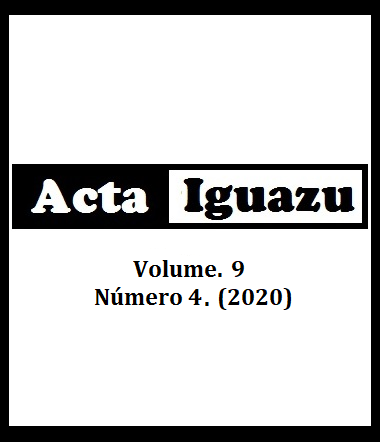Methods of preparing aqueous extract and bioactivity of Mentha spicata L. on Raphanus sativus L. seeds
DOI:
https://doi.org/10.48075/actaiguaz.v9i4.25680
Agências de fomento
Universidade Federal da Fronteira Sul (UFFS), Coordenação de Aperfeiçoamento de Pessoal de Nível Superior (CAPES)
Palavras-chave:
Allelopathy, Phenolic compounds, Spearmint.Resumo
The plant interaction knowledge can be applied in several sectors in agriculture such as crop rotation, weed management, green manure and the use of cover crops. Studies on the allelopathic potential of certain plants have been carried out with the application of vegetable extracts on the seeds of a sensitive plant, however, a consensus has not been reached regarding the best way to prepare such extracts. This study aimed to evaluate the efficacy of methods of extraction of allelopathic compounds and the bioactivity of different concentrations of the Mentha spicata L. aqueous extract on Raphanus sativus L. seeds. A completely randomized design was used in a 5x4 factorial scheme with four replications and four extraction methods (infusion, grinding in a blender, drying at 40 °C and 70 °C) and five concentrations (0; 25; 50; 75 and 100%). The variables investigated were: phenolic compounds quantification, germination, germination speed index (GSI), mean germination time (MGT), radish shoot and root length. The extract presenting the highest amount of phenolic compounds was prepared via infusion (724.36 µg/mL), followed by drying at 40 °C (605.07 µg/mL), blending (594.12 µg/mL) and drying at 70 °C (529.36 µg/mL). The Mentha spicata L. aqueous extracts interfered in the radish seed physiological quality, by inhibiting germination, GSI and MGT increase, mainly when in higher concentrations. There was a directly proportional relation between the quantity of phenolic compounds extracted through different extraction methods and the interference in the physiological quality of the radish seeds.Downloads
Publicado
28-12-2020
Como Citar
XAVIER, L. P.; PIRES, A.; BONOME, L. T. da S.; MOURA, G. S.; FRANZENER, G.; FERNANDES, A. P. Methods of preparing aqueous extract and bioactivity of Mentha spicata L. on Raphanus sativus L. seeds. Acta Iguazu, [S. l.], v. 9, n. 4, p. 118–130, 2020. DOI: 10.48075/actaiguaz.v9i4.25680. Disponível em: https://e-revista.unioeste.br/index.php/actaiguazu/article/view/25680. Acesso em: 6 dez. 2025.
Edição
Seção
ARTIGOS CIENTÍFICOS
Licença
Aviso de Direito Autoral Creative Commons
Política para Periódicos de Acesso Livre
Autores que publicam nesta revista concordam com os seguintes termos:
1. Autores mantém os direitos autorais e concedem à revista o direito de primeira publicação, com o trabalho simultaneamente licenciado sob a Licença Creative Commons Attribution que permite o compartilhamento do trabalho com reconhecimento da autoria e publicação inicial nesta revista.2. Autores têm autorização para assumir contratos adicionais separadamente, para distribuição não-exclusiva da versão do trabalho publicada nesta revista (ex.: publicar em repositório institucional ou como capítulo de livro), com reconhecimento de autoria e publicação inicial nesta revista.
3. Autores têm permissão e são estimulados a publicar e distribuir seu trabalho online (ex.: em repositórios institucionais ou na sua página pessoal) a qualquer ponto antes ou durante o processo editorial, já que isso pode gerar alterações produtivas, bem como aumentar o impacto e a citação do trabalho publicado (Veja O Efeito do Acesso Livre).
Licença Creative Commons
Esta obra está licenciada com uma Licença Creative Commons Atribuição-NãoComercial-CompartilhaIgual 4.0 Internacional, o que permite compartilhar, copiar, distribuir, exibir, reproduzir, a totalidade ou partes desde que não tenha objetivo comercial e sejam citados os autores e a fonte.


